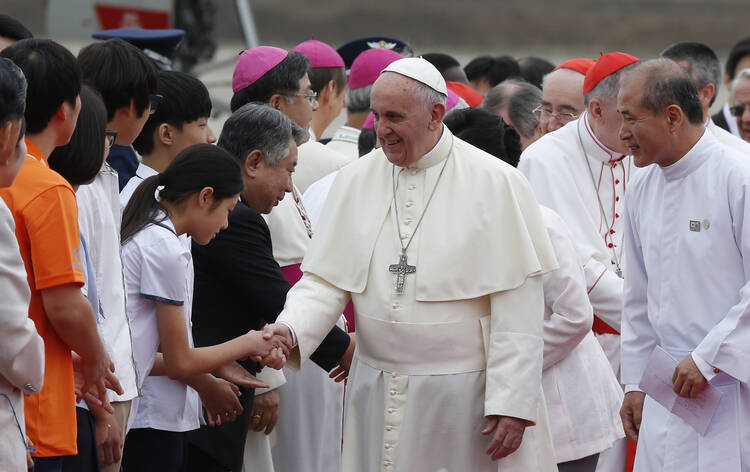Pope Francis is not a man to ignore the real problems that touch people’s lives. It came as no surprise therefore that on his first day in Korea he zoned in with passion on the urgent need for peace and reconciliation in this divided peninsula.
The urgency was highlighted even more by the fact that North Korea test-fired five missiles into the sea off the coast here on August 14, three before his arrival and two a short time later. Whatever the reasons for this display of force, apparently the seventeenth of its kind this year, the pope made no reference to it in his strong pitch for reconciliation and peace.
“Korea’s quest for peace is a cause close to our hearts, for it affects the stability of the entire area and indeed of our war torn world,” he told South Korea’s government, Civil authorities and the diplomatic corps on August 14, in a late-afternoon speech at the Blue House, as the presidential palace in Seoul is called because of the color of the tiles on its roof.
Significantly, in his address, he used the inclusive term “Korea” throughout. He did so because he knows well that the 69-year old division of this land is an issue that reaches deep into the hearts of people on both sides of the 38th parallel along which the demilitarized zone of Panmunjom was established following the armistice in July 1953.
That armistice was reached at the end of the three year Korean war (1950-53) that left 1.5 million people dead, 3.6 million injured, and has caused the separation of 10 million people from their own families, as the president of the Korean Bishops Conference, Bishop Peter Kang U-il, stated later that day when he welcomed the pope to a meeting with the country’s 35 bishops. “Up to this day, the two Koreas are in a state of temporal suspension of war,” he recalled.
The Jesuit pope is well aware of the very delicate nature of the political situation in Korea, and the tensions the decades old division of the peninsula continue to provoke in a region that is becoming ever more militarized. He knows that North Korea’s nuclear ambitions provoke deep fear in the inhabitants of the South.
President Park, in her welcome speech to the pope, gave strong voice to that fear when she stated in unambiguous terms: “North Korea’s nuclear program must stop, we must have a nuclear free peninsula.”
Though she has been taking a hard line with North Korea on several fronts, this graduate of Seoul’s Jesuit-run Sogang University, who is contested by many people here, told the pope “we believe that the pain of division will be healed thanks to your visit.”
Pope Francis came here not as an observer but as one who wishes, in whatever way possible, to make a contribution to the search for peace in this seemingly intractable situation. In his speech, he encouraged and urged the rulers and politicians of South Korea to opt for the path of reconciliation and solidarity and not give in to other temptations that cannot lead to peace.
“The quest for peace” represents “a perennial challenge of breaking down the walls of distrust and hatred by promoting a culture of reconciliation and solidarity,” he told them. Advocating the path of diplomacy to resolve problems, Francis said – in words that could equally apply to North Korea – “peace can be won through quiet listening and dialogue, rather than by mutual recrimination, fruitless criticism and displays of force.”
And while peace is not simply the absence of war, “but the work of justice,” Pope Francis said this justice “calls for the discipline of forbearance; it demands that we not forget past injustices but overcome them through forgiveness, tolerance and cooperation.” Moreover, he said, “it demands the willingness to discern and attain mutually beneficial goals, building foundations of mutual respect, understanding and reconciliation.”
Everyone here realizes that the path of peace and reconciliation is an uphill one, not only because of the eccentric and rather unpredictable nature of the leadership in North Korea, and the political complexities and ambitions of other actors in this region of the world, but also because the two states have followed very different ideological, political, economic and social directions for more than a half century. This point was put into sharp focus by the Bishop Peter Kang U-il.
“There is an increasing cultural heterogeneity” between the two Koreas, he observed, so much so that even if unification was achieved he wondered whether South Koreans “would then be able to accept and warmly embrace the people of the North and consider them as our own brother and neighbor?” He also questioned whether the Catholic Church in South Korea, despite its amazing growth, “has created an authentically evangelical community,” such as would help to overcome this divide. It is a question the pope is also raising, though from other angles, in these days.
That problem of course is not new: it was faced in Germany at the time of, and in the years following, the reunification of the country in 1989. In this context, it is interesting to recall that in the 1990s, Sogang University and other institutions in Korea studied the German experience and in particular the role of the Catholic and Protestant Churches in the fall of the communist regime in the German Democratic Republic and in the reunification process. In the light of that research, a national conference was held in December 1997 and on that occasion the famous Cardinal Stephen Kim of Seoul declared that the work of reconciliation and unification is the central task of the Catholic Church in Korea at the beginning of the 21st century.
That task remains, and the Pope is likely to underline its importance on his last day here when he will celebrate mass in the cathedral of Myeong-dong in Seoul for peace and reconciliation in this land.








